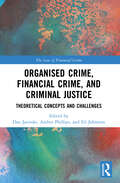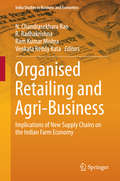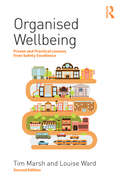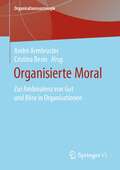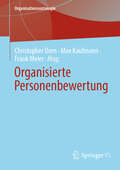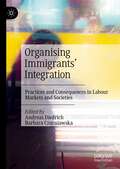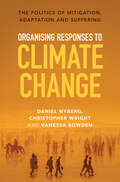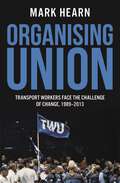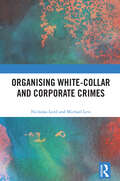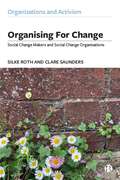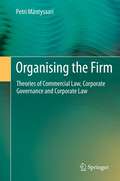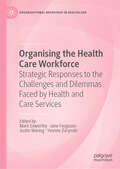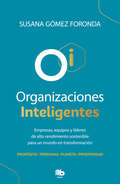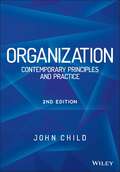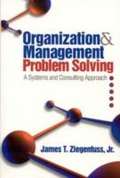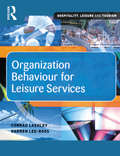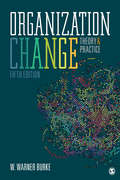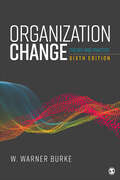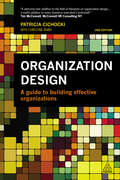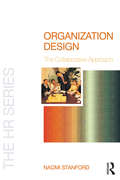- Table View
- List View
Organised Crime, Financial Crime, and Criminal Justice: Theoretical Concepts and Challenges (The Law of Financial Crime)
by Dan Jasinski, Amber Phillips, and Ed JohnstonOrganised crime and financial crime are pressing global problems, increasingly recognised as policy priorities both by national governments and international bodies and corporations. This proudly interdisciplinary collection is built on the premise that these topics are too often artificially separated, both in scholarship and the classroom. Bringing together scholars from law, the social sciences, and the humanities, this book showcases a diverse range of perspectives on these complex and compelling global issues, and the criminal justice challenges that they pose. The themes discussed include legal theory and procedure; regulation and enforcement; prevention and punishment; media representation and perception. Readers are encouraged to think outside traditional disciplinary bounds and form their own connections and conclusions inspired by the juxtaposition of perspectives rarely seen together in the same volume.
Organised Retailing and Agri-Business
by N. Chandrasekhara Rao R. Radhakrishna Ram Kumar Mishra Venkata Reddy KataThis book examines the performance of organized retail chains supplying the agri-input and output services in terms of achieving their objective of utilising collective bargaining power in the marketing of their agricultural produce, integrating empirical experience from India and other selected developing countries. The scenario of marketing for agricultural products has been undergoing rapid changes with the rise of organised retailing (the Indian term for 'supermarkets'), a process that is likely to accelerate in years to come, with India being on the threshold of a supermarket revolution. In fact, India is referred to as the 'final frontier' in the development of supermarkets. The growth of supermarkets in India is faster than that in China, which is also witnessing an exponential growth as part of the "third wave" of supermarket diffusion. The book investigates the links between organised retailing and farmers and farming in India. Apart from raising issues of equity, inclusion and problems in policy framework, it also discusses policy interventions that are essential in order to make the development of organised retailing more inclusive and beneficial to the farming community and agricultural sector. The book further serves as a guide for policy makers, helping them to select the right kind of interventions to balance growth with equity as market forces penetrate deeper into the agricultural marketing space.
Organised Wellbeing: Proven and Practical Lessons from Safety Excellence
by Tim Marsh Louise WardWellbeing is now at the top of almost everyone’s agenda and many technical books have been published on the topic. More than that, an ever-increasing number of organisations are understanding that getting wellbeing right is a win-win that can boost profits or simply make sustainability viable. Organised Wellbeing: Proven and Practical Lessons from Safety Excellence seeks to present, in a user-friendly way, all of the key wellbeing themes. It views these through the lessons learnt from safety excellence because, at present, UK safety is world class but, frankly, wellbeing seldom is. In any organisation, culture is even more important than strategy and tactics, and training is just the base of a process in which facilitation and embedding of key behaviours and mindsets is the essential element. Practical and coordinated processes, not initiatives, are required. This book, therefore, seeks to show how aspects of wellbeing, both organisational and personal, are inexorably interconnected. From an organisational perspective, approaches need to address the truth that ‘good work is good for you’. This book, also an individual guide to thriving with passion, compassion, humour and style, is essential reading for health and safety, occupational health and HR professionals at all levels. It is also highly recommended for all managers and staff who seek to maximise their potential and that of their colleagues.
Organisierte Moral: Zur Ambivalenz von Gut und Böse in Organisationen (Organisationssoziologie)
by Cristina Besio André ArmbrusterDer Band untersucht, inwieweit moralisch gutes oder schlechtes Handeln organisiert werden kann. Die Diskussion soziologischer Erklärungen des normativ Guten und Bösen in und von Organisationen beleuchtet den ambivalenten Zusammenhang von Moral und Organisation, da Organisationen sowohl für moralische Anliegen eintreten als auch moralisch-ethische Normen (teilweise sogar absichtlich) verletzen. Diese Ambivalenz adressiert der Band durch theoretisch-konzeptionelle Beiträge sowie durch empirische Studien. Der Band zeigt damit die große Varietät in der empirischen Beobachtbarkeit und der sozialwissenschaftlichen Analyse der Moralität von Organisationen – ohne selbst für oder gegen Moral zu argumentieren.
Organisierte Personenbewertung (Organisationssoziologie)
by Christopher Dorn Frank Meier Max KaufmannOrganisationen produzieren vielfältige Bewertungen von Personen. Der Band fragt nach Funktionen und Folgen organisierter Personenbewertung und danach, wie der Organisationskontext Personenbewertung prägt. Bewertungssoziologisch geht der Band der Vermutung nach, dass sich die Bewertung von Personen systematisch von der Bewertung anderer Objekte unterscheidet: Personen sind sakrale Objekte der Moderne, deren Bewertung sich als überaus heikel erweist, aber gerade in Organisationskontexten dennoch routinemäßig stattfindet. Personen sind darüber hinaus auch Subjekte, die sich auf ihre Bewertung einstellen, auf sie reagieren, an ihr mitwirken. Vor diesem Hintergrund fragen die Beiträge des Bandes, wie sich die Besonderheiten des Bewertungsobjekts Person auf organisierte Personenbewertungen auswirken, welche Aspekte von Personalität dabei berücksichtigt werden und welche Bedeutung Personenbewertungen für Organisationen haben.
Organising Immigrants' Integration: Practices and Consequences in Labour Markets and Societies
by Barbara Czarniawska Andreas DiedrichThis collection of field studies offers novel insights into the issues of migration and integration of immigrants. The focus of the chapters is on actions, processes, and complexity of organising practices, in contrast to more policy-oriented works. The contributors address vital questions: How is the labour market integration of refugees and other immigrants being organised in practice? What ideas of integration give rise to, and are promoted by contemporary integration initiatives? And what are the effects of these integration initiatives – on immigrants’ lives, and on their labour market integration in terms of diversity, gender, and power relations? With contributions highlighting the importance of coordination and collaboration for the successful organising of integration, this book should be of interest to researchers and advanced students from the fields of management and organisation studies, public administration and management, migration and integration studies, sociology, cultural studies and science and technology studies. It should also interest professionals and policymakers working with integration who face the challenges described here in their daily work.
Organising Music
by Nic Beech Charlotte GilmoreOrganisational theorists have become increasingly interested in the creative industries, where practices that are commonplace are of particular interest to organisations in other sectors as they look for new ways to enhance performance. Focusing on the music industry, this book sets up a unique dialogue between leading organisational theorists and music professionals. Part I explores links between organisation theory and the creative industries literature, concentrating on practices of organising and knowledge mobilisation, followed by an in-depth discussion of key theoretical concepts by subject experts. Part II provides a diverse range of 'tales from the field', including examples from classical orchestras, folk, indie and punk. The concluding chapter examines the shared dialogue to reveal what practice in the musical field can learn from organisational theory, and vice versa. This innovative book will interest graduate students and researchers in the fields of organisation studies, music management and the creative industries.
Organising Responses to Climate Change: The Politics of Mitigation, Adaptation and Suffering
by Christopher Wright Daniel Nyberg Vanessa BowdenClimate change is the most important issue now facing humanity. As global temperatures increase, floods, fires and storms are becoming both more intense and frequent. People are suffering. And yet, emissions continue to rise. This book unpacks the activities of the key actors which have organised past and present climate responses – specifically, corporations, governments, and civil society organisations. Analysing three elements of climate change – mitigation, adaptation and suffering – the authors show how exponential growth of the capitalist system has allowed the fossil fuel industry to maintain its dominance. However, this hegemonic position is now coming under threat as new and innovative social movements have emerged, including the fossil fuel divestment movement, Fridays for Future, Extinction Rebellion and others. In exposing the inadequacies of current climate policies and pointing to the possibilities of new social and economic systems, this book highlights how the worst impacts of climate change can be avoided.
Organising Union: Transport Workers Face the Challenge of Change, 1989-2013
by Mark HearnBetween 1989 and 2013 every industry sector covered by the Transport Workers Union in New South Wales was utterly transformed by processes of globalisation and technological and market change. Large players consumed small firms; in turn, the bigger companies were often acquired by global players. The lesson that emerges from Organising Union is simple: the value of solidarity. In 2001 redundant Ansett workers were told they would never see their entitlements. In 2006 Tooheys owner-drivers were suddenly terminated by the company; the goodwill invested in their trucks and business was declared worthless. Ansett workers received almost all their entitlements—an unprecedented 95 cents in the dollar. The Tooheys drivers' jobs were saved, the value of their goodwill upheld. Those outcomes were possible only because of the solidarity of transport workers and the support of their union. No one else stood alongside the workers at Ansett and Tooheys as consistently and tenaciously as their own union. Organising Union explores the relationship between the union and key industry players, and between the union and governments. The TWU has often been at the centre of controversy: the turbulent 1989 union election punctuated by accusations of rorts and fist fights; the clashes with the Hawke and Keating governments over the Accord and enterprise bargaining, resulting in the TWU disaffiliating from the ACTU and a truck blockade of the Reserve Bank's Sydney headquarters; the devastating 2001 Ansett closure and the long industrial war with Qantas culminating in the dramatic 2011 airline shutdown; the struggle to achieve 'safe rates' for truckies against the resistance of employers and governments. In the face of these challenges solidarity—the strength of an organising union—has held the TWU together.
Organising White-Collar and Corporate Crimes
by Nicholas Lord Michael LeviThis book explores how we can re-constitute our approach to analysing and empirically investigating the organisation of white-collar and corporate crimes, with a view to building fuller theoretical and empirical accounts. The work demonstrates how knowledge can be produced and systematised within a conceptual and analytical framework concerned with understanding how such crimes are organised, why they are organised as they are, who gets involved in them as primary offenders and as facilitators, and the ‘real’ factors that shape these organisational dynamics over time in particular contexts and under varying conditions. In doing so, the book examines the distal (far-off) and proximal (close) social arrangements and relations that create and shape emergent white-collar crime opportunities and their structures. It also investigates the mechanisms, relationships, processes, and conditions that are necessary for the commission, or the unfolding, of white-collar crimes, or for their non-commission. How these are contingently connected to particular contexts is explored. The work also considers the people who collaborate, connect, and otherwise associate, whether ephemerally or for longer periods, in the pursuit of criminal goals and the actual or potential skills, expertise, and abilities of these people to accomplish or resist particular behaviours that are required of them. Finally, the book assesses the human, social, cultural, and material antecedents that enable white-collar crimes to flourish or fade. The work will be of particular interest to scholars theorising about and empirically investigating white-collar and corporate crimes, or seeking to understand empirical approaches to analysing such behaviours and other types of crime. It is primarily aimed at critical social scientists, including criminologists and sociologists, as well as socio-legal, business, economics, and political studies scholars. The work will also be of interest to practitioners and policymakers keen to learn more about how and why these crimes are organised as they are.
Organising for Change: Social Change Makers and Social Change Organisations
by Silke Roth Clare SaundersBased on decades of research, this book explores global social change processes through the concepts of social change organisations (SCOs) and social change makers (SCMs) – the individuals working within and alongside SCOs. The book delves into a vast array of compelling social justice issues, from tackling inequality to championing human rights, bridging the realms of social movement and third sector research. Inspiring and empowering, this is essential reading for scholars, students, NGOs and activists alike.
Organising the Firm: Theories of Commercial Law, Corporate Governance and Corporate Law
by Petri MäntysaariThe theoretical basis of commercial law, corporate governance law, and corporate law is still unsatisfactory. There essentially is no theory of commercial law, and existing theories of corporate governance and corporate law cannot explain the behaviour of firms or the contents of existing regulation. This book proposes a coordinated solution for all three areas. The starting point is that all three areas deal with the organisation of firms. Commercial law, corporate governance, and corporate law are therefore studied from the perspective of the firm rather than that of the judge or the investor. Changing the perspective makes it easier to formulate an "umbrella" theory of commercial law, and theories of corporate governance and corporate law as applications of the main theory. The book provides examples of how the proposed theories work by studying legal corporate governance tools and practices that increase the sustainability of the firm. Sustainability can be bolstered by making the governance model more self-enforcing and ensuring that it fosters innovation.
Organising the Health Care Workforce: Strategic Responses to the Challenges and Dilemmas Faced by Health and Care Services (Organizational Behaviour in Healthcare)
by Mark Exworthy Yvonne ZurynskiThis book explores some of the most daunting workforce challenges in healthcare services in history. These challenges are not new, but reflect decades of under-investment and lack of strategic planning. According to the World Health Organization, there will be a global shortage of 18 million health workers by 2030, mainly in low- and middle-income countries. This book draws upon the best papers from the international Organisational Behaviour in Health Care (OBHC) conference, which took place at the University of Birmingham in 2022, hosted by the Health Services Management Centre. The OBHC conference is linked to the Society for Studies in Organising Health Care (SHOC), a learned society affiliated to the UK Academy of Social Sciences. Taking an international approach, this edited volume incorporates the highest quality papers submitted by members of the society and Key themes explored include clinical leadership in times of crisis, human resource management in homecare, and organisational behaviour and the health care workforce. With its in depth coverage, this book will appeal to international healthcare practitioners.
Organizaciones inteligentes
by Susana Gómez ForondaNuevos retos y nuevos modelos para una nueva era. Un libro imprescindible para directivos, mandos intermedios, consejeros y consultores comprometidos con emprender el camino del cambio inteligente. El mundo empresarial está enfrentándose a uno de los mayores desafíos de su historia. Las organizaciones que tendrán éxito en este siglo serán muy diferentes a las que lo tuvieron en el siglo XX. Por eso, es fundamental desarrollar un paradigma que responda de manera efectiva a los retos actuales y logre un alto rendimiento sostenible desde la perspectiva de «las 3 P»: planeta, personas y prosperidad financiera. Susana Gómez Foronda, experta reconocida a nivel internacional en cultura, liderazgo y talento, ha creado para ello el Modelo Organizaciones Inteligentes (OI), con el que aborda, en un lenguaje claro y con profundidad pragmática las grandes cuestiones de nuestro tiempo: ¿Qué es lo que hace que en una organización las cosas funcionen de manera excepcional? ¿Cómo desarrollar una organización inteligente? ¿Por qué es esencial reforzar de manera proactiva la cultura, el propósito y los valores? ¿Dónde has de poner el foco si quieres configurar un equipo de alto rendimiento? ¿Cuáles son las claves para elevar tu efectividad como líder en un contexto tan volátil y complejo? PROPÓSITO · PERSONAS · PLANETA · PROSPERIDAD
Organization
by John ChildThe definitive organization management text for executives andaspiring business leaders Organization: Contemporary Principles and Practices, SecondEdition is the completely updated and revised landmark guide to"macro" organization theory and design, fully grounded in currentinternational practice. International management expert John Childexplores the conditions facilitating the development of neworganizational forms and provides up-to-date coverage of the keydevelopments driving new organization structure and practice. Thisrevised Second Edition includes a new introductory section onOrganization Theory as well as a complete Instructor Manual updatedwith new material on the basic principles of organizationaldesign.With detailed case studies and examples from throughout the UK,Europe, Asia and North America, Organization provides atruly international overview for advanced students and businessexecutives who want to be at the forefront of the evolution inOrganization Theory. 21st Century organizations will befaced with entirely new challenges and opportunities than thosefaced by previous generations, and emerging business leaders mustunderstand the new "macro" realities in order to succeed.Organization will help readers:Understand the "macro" organization, which is distinct fromorganizational behaviourExplore the way organizations fit into the internationalbusiness environment and global economyAnalyze the way organizational structure and design affectmanagement performanceApply advanced organization theory and principles to day to daymanagement activitiesWritten by one of the foremost scholars, the fully updatedSecond Edition of this successful text provides executives andadvanced business students with a wide-ranging and trustworthyguide to organizations as the conditions for their survival in ourglobal business environment change.
Organization And Management Problem Solving: A Systems And Consulting Approach
by James T. ZiegenfussBased on a broad range of case studies, Organization and Management Problem Solving is an insightful text designed to improve the application of organization theory and systems thinking in teaching and practice. This book illustrates the five key themes in the nature of organization and management--technical, structural, psychosocial, managerial, and cultural--through the analysis of measured incidents tested by students. This book is relevant to consultants, academics, and professional managers in a number of settings (academic, military, business organizations, and research institutes) and disciplines (including development and change, management, human resources, social psychology, communication, sociology, and psychology).
Organization Behavior Reading: Negotiation
by Max H. Bazerman Francesca Gino Katherine ShonkManagerial, executive, and entrepreneurial success requires the ability to negotiate. The essential reading and recommended module plan will help students to become more effective negotiators by: 1) mastering a negotiation framework that will help them analyze, prepare for, and execute negotiations more systematically-and hence, more effectively-in a wide variety of contexts; 2) building a negotiation toolkit that consists of practical strategies for creating and capturing value in negotiation; and 3) learning how to create a negotiation environment that helps diagnose individual needs, and allows negotiators to identify techniques for mitigating weaknesses and leveraging their strengths. The supplemental reading addresses two additional topics: cross-cultural negotiations and gender issues in negotiation.
Organization Behaviour for Leisure Services
by Darren Lee-Ross Conrad LashleyOrganization Behaviour for Leisure Services provides the reader with the conceptual tools necessary for analysing organizational behaviour in the context of hospitality, leisure and tourism provision, and understaanding events in order to take appropriate management action.Taking the view that leisure services involve an array of industry sectors - they are related, for instance, to work-time spent eating, drinking and staying away from home, as well as the more obvious recreational pursuits - the text uses examples and case studies from a wide range of international businesses such as hotels, restaurants, museums, shopping malls and sports stadia. Specific examples used are from Marriotts, McDonald's, Trafford Centre and many more. With a user-friendly structure and style, the text is an ideal introduction to the fundamental issues involved - perfect for students and managers alike. This book discusses and questions a number of key elements, including: The individual and the organization Groups in the organization Organizational structures and behaviour Management within the organization Commercial hospitality, leisure and tourism in a service context There is a Tutor Resource pack available to lecturers who adopt this text. Accredited lecturers can request access to download this material by going to http://books.elsevier.com/academic/defaultmanuals.asp? to request access.
Organization Capital Readiness
by Robert S. Kaplan David P. NortonTo complement alignment of competencies and technologies, executives must also develop organization capital, defined as the ability of the organization to mobilize and sustain the process of change required to execute the strategy. Organization capital provides the capability for integration so that individual intangible human and information capital assets, as well as tangible physical and financial assets, are not only aligned to the strategy, but are integrated and working together to achieve the organization's strategic objectives. This chapter provides a framework for describing and measuring organization capital.
Organization Change: Theory and Practice
by W. Warner BurkeChange is a constant in today's organizations. Leaders, managers, and employees at all levels must understand both how to implement planned changed and effectively handle unexpected change. The Fifth Edition of the Organization Change: Theory and Practice provides an eye-opening exploration into the nature of change by presenting the latest evidence-based research to discuss a range of theories, models, and perspectives on organization change. Bestselling author, W. Warner Burke, skillfully connects theory to practice with modern cases of effective and ineffective organization change, recent examples of transformational leadership and planned and revolutionary change, and best practices to successfully influence change. This fully-updated new edition also includes a new chapter on healthcare and government organizations, offering practical applications for non-profit organizations.
Organization Change: Theory and Practice
by W. Warner BurkeChange is a constant in today's organizations. Leaders, managers, and employees at all levels must understand both how to implement planned changed and effectively handle unexpected change. The Fifth Edition of the Organization Change: Theory and Practice provides an eye-opening exploration into the nature of change by presenting the latest evidence-based research to discuss a range of theories, models, and perspectives on organization change. Bestselling author, W. Warner Burke, skillfully connects theory to practice with modern cases of effective and ineffective organization change, recent examples of transformational leadership and planned and revolutionary change, and best practices to successfully influence change. This fully-updated new edition also includes a new chapter on healthcare and government organizations, offering practical applications for non-profit organizations.
Organization Change: Theory and Practice
by W. Warner BurkeChange is a constant in today′s organizations. Leaders, managers, and employees must understand how to implement planned change and handle unexpected change. The Sixth Edition of Organization Change: Theory and Practice provides an eye-opening exploration into the nature of change by presenting the latest evidence-based research to discuss a range of theories, models, and perspectives on organizational change. Bestselling author, W. Warner Burke, skillfully connects theory to practice with modern cases of effective and ineffective organizational change, recent examples of transformational leadership and planned and revolutionary change, and best practices to successfully influence change. The fully-updated sixth edition includes a new chapter on current evidence about organization change, including reviews of prescriptive models of planned change, evidence-based principles of change management, the role of an organization′s history as part of the change process, and leaders′ impact on organizational change.
Organization Change: Theory and Practice
by W. Warner BurkeChange is a constant in today′s organizations. Leaders, managers, and employees must understand how to implement planned change and handle unexpected change. The Sixth Edition of Organization Change: Theory and Practice provides an eye-opening exploration into the nature of change by presenting the latest evidence-based research to discuss a range of theories, models, and perspectives on organizational change. Bestselling author, W. Warner Burke, skillfully connects theory to practice with modern cases of effective and ineffective organizational change, recent examples of transformational leadership and planned and revolutionary change, and best practices to successfully influence change. The fully-updated sixth edition includes a new chapter on current evidence about organization change, including reviews of prescriptive models of planned change, evidence-based principles of change management, the role of an organization′s history as part of the change process, and leaders′ impact on organizational change.
Organization Design
by Patricia Cichocki Christine IrwinWith the rate of change in organizations at an all-time high, the need for strong organization design has never been more pressing. Organization Design provides a complete road map to design and delivery and covers all the critical areas including downsizing, outsourcing, job design, change management and re-structuring. This thoroughly revised edition is a practical toolkit to take organization designers from start to finish, outlining the basic theory, providing a step-by-step approach to implementation, and offering solutions to the recurring challenges that will inevitably be met along the way.
Organization Design
by Naomi StanfordOrganization Design looks at how you need to change the ways your organization does things in order to increase productivity, performance, and profit. Providing the knowledge and method to handle the kind of recurring organisational change that all businesses face, those which do not involve transforming the entire enterprise but which necessitate significant change at the business unit, divisional, functional, facility or local levels. The problem lies in knowing what needs to change and how to change it. Taking the organisation as a designed system, it describes four major elements of organizations: the work - the basic tasks to be done by the organisation and its parts, the people - characteristics of individuals in the organization, formal organization - structures eg the organisation hierarchy, processes, and methods that are formally created to get individuals to perform tasks, informal organization - emerging arrangements including variations to the norm, processes, and relationships, commonly described as the culture or 'the way we do things round here'. The way these four elements relate, combine and interact affects productivity, performance and profit. Most books on this subject target a wide management audience rather than HR, this is specifically written for HR practitioners and line managers working together to achieve the goal. It clarifies why and how organisations need to be in a state of readiness to design or redesign and emphasises that people as well as business processes must be part of design considerations.
